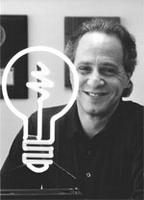| Order vs. orderliness of data | 2004-01-19 15:30 3 comments |
 by Flemming Funch by Flemming FunchRay Kurzweil on the nature of order, via SynEarth: The concept of the "order" of information is important here, as it is not the same as the opposite of disorder. If disorder represents a random sequence of events, then the opposite of disorder should imply "not random." Information is a sequence of data that is meaningful in a process, such as the DNA code of an organism, or the bits in a computer program. Noise, on the other hand, is a random sequence. Neither noise nor information is predictable. Noise is inherently unpredictable, but carries no information. Information, however, is also unpredictable. If we can predict future data from past data, then that future data stops being information. We might consider an alternating pattern ("0101010. . . .") to be orderly, but it carries no information (beyond the first couple of bits). Thus orderliness does not constitute order because order requires information. However, order goes beyond mere information. A recording of radiation levels from space represents information, but if we double the size of this data file, we have increased the amount of data, but we have not achieved a deeper level of order. Order is information that fits a purpose. The measure of order is the measure of how well the information fits the purpose. In the evolution of life-forms, the purpose is to survive. In an evolutionary algorithm (a computer program that simulates evolution to solve a problem) applied to, say, investing in the stock market, the purpose is to make money. Simply having more information does not necessarily result in a better fit. A superior solution for a purpose may very well involve less data. The concept of "complexity" is often used to describe the nature of the information created by an evolutionary process. Complexity is a close fit to the concept of order that I am describing, but is also not sufficient. Sometimes, a deeper order—a better fit to a purpose—is achieved through simplification rather than further increases in complexity. For example, a new theory that ties together apparently disparate ideas into one broader more coherent theory reduces complexity but nonetheless may increase the "order for a purpose" that I am describing. Indeed, achieving simpler theories is a driving force in science. Evolution has shown, however, that the general trend towards greater order does generally result in greater complexity. Thus improving a solution to a problem—which may increase or decrease complexity—increases order.That's pretty profound. And obvious at the same time. Greater order, of the kind of evolving life and intelligence, typically means more complexity. But of course complexity by itself doesn't produce emergent order. Sometimes it does, and sometimes simplicity does the trick. The key is whether we get to the deeper level of order. Whether problems are being solved at a higher level. |